How to LISTEN to GREAT MUSIC
A Guide to Its History, Culture, and Heart
ROBERT GREENBERG

PLUME
Published by Penguin Group
Penguin Group (USA) Inc., 375 Hudson Street, New York, New York 10014, U.S.A. Penguin Group (Canada), 90 Eglinton Avenue East, Suite 700, Toronto, Ontario, Canada M4P 2Y3 (a division of Pearson Penguin Canada Inc.) Penguin Books Ltd., 80 Strand, London WC2R 0RL, England Penguin Ireland, 25 St. Stephens Green, Dublin 2, Ireland (a division of Penguin Books Ltd.) Penguin Group (Australia), 250 Camberwell Road, Camberwell, Victoria 3124, Australia (a division of Pearson Australia Group Pty. Ltd.) Penguin Books India Pvt. Ltd., 11 Community Centre, Panchsheel Park, New Delhi 110 017, India Penguin Books (NZ), 67 Apollo Drive, Rosedale, North Shore 0632, New Zealand (a division of Pearson New Zealand Ltd.) Penguin Books (South Africa) (Pty.) Ltd., 24 Sturdee Avenue, Rosebank, Johannesburg 2196, South Africa
Penguin Books Ltd., Registered Offices: 80 Strand, London WC2R 0RL, England
First published by Plume, a member of Penguin Group (USA) Inc.
Copyright The Teaching Company, LLC, 2011
All rights reserved
 REGISTERED TRADEMARKMARCA REGISTRADA
REGISTERED TRADEMARKMARCA REGISTRADA
LIBRARY OF CONGRESS CATALOGING-IN-PUBLICATION DATA
Greenberg, Robert, 1954
How to listen to great music: a guide to its history, culture, and heart / Robert Greenberg.
p. cm.
Includes bibliographical references and index.
ISBN: 978-1-101-51395-8
1. Music appreciation. I. Title.
MT6.G76 2011
781.1'7dc22
2010050220
Without limiting the rights under copyright reserved above, no part of this publication may be reproduced, stored in or introduced into a retrieval system, or transmitted, in any form, or by any means (electronic, mechanical, photocopying, recording, or otherwise), without the prior written permission of both the copyright owner and the above publisher of this book.
PUBLISHERS NOTE
While the author had made every effort to provide accurate telephone numbers and Internet addresses at the time of publication, neither the publisher nor the author assumes any responsibility for errors, or for changes that occur after publication. Further, the publisher does not have any control over and does not assume any responsibility for author or third-party Web sites or their content.
The scanning, uploading, and distribution of this book via the Internet or via any other means without the permission of the publisher is illegal and punishable by law. Please purchase only authorized electronic editions, and do not participate in or encourage electronic piracy of copyrighted materials. Your support of the authors rights is appreciated.
To my wife and my mother, who sing to me still:
Diane Elizabeth Clymer-Greenberg (19742009)
Natalie Ruth Greenberg (19282010)
Contents
How to LISTEN to GREAT MUSIC
CHAPTER 1
Understanding and Listening to Music
W e are hardwired to hear and make music. Yes, we will sigh with pleasure when we hear a favorite theme played by an orchestra, and who hasnt felt a stab of nostalgia, or even brushed away a tear, when hearing a song reminiscent of youth or a lost love? However, such exquisite moments notwithstanding, the musical experience represents something far deeper.
Broadly defined, music is sound in time. Sound is nothing less than our perception of the vibrations, the movement, of the universe around us. Music is an intensification, a crystallization, a celebration, a glorification, of that movement and those vibrations. Pretty heady stuff. Far beyond spoken languagewhich, with its sounds in time, might rightly be considered a low-end sort of musicmusic is a universal language; one need not speak Ashanti in order to groove to West African drumming; or German in order to be emotionally flayed by Beethoven; or English to totally freak when listening to Bruce Springsteen. Say it with flowers? Nah. If you really want to get your expressive point across, say it with music.
No human activity occurs in a vacuum, and this is particularly true for the arts. Music, painting, sculpture, cinema, literature, and all of their brother and sister arts are mirrors of the world in which their creators live. Art crystallizes and intensifies human experience, rendering it universal in the process. But let us not mistake the universal end product for the circumstances around its creation. Art does not shape its time; rather, the times shape the artist, who then gives voice to his time in his own special way. To understand an artists world and something of the artist herself are the first requisite steps to understanding the artists work, its style, and its meaning.
What were discussing here is context, and thats a large part of what this book is about. By creating a historical context for the composer and music understudy, we will know something of what that composers contemporaries knew. When we listen this way, with the ears and understanding of a contemporary audience, centuries of accumulated dust and grime are swept away and we perceive the music were hearing as new, relevant, and utterly alive. When heard contextually, all music becomes contemporary music!
Thus, the goal of this book is to create a degree of understandingof context that will allow us to hear, to listen to, music with new ears.
Along with this historical context, this book will provide the reader with several mutually reinforcing tools to further understand the music under discussion, including terminological tutorials and guided listening of representative musical compositions. A working vocabulary of selected terms is a key to conscious perception. It is my firm belief that we cannot make fine distinctions without a vocabulary capable of framing those distinctions. Winespeak, for example (its a youthful, chewy cabernet redolent with shoe leather and yesterdays newspaper) is, for all its silliness, an absolutely necessary syntactical device for addressing distinctions that, once named, can be perceived. For the same reason, a few well-chosen terms will be good for our musical palates.
This book will examine representative musical compositions in two ways. Certain key works will be discussed in detail in the body of the text. In addition, guided listening will be provided for various other works in musical sidebars that I have called Music Boxes. I would encourage you to acquire recordings of these representative works in the format of your choice (CD, MP3, LP, 78; though I would counsel against 8-track cartridges, a nasty format that) and to listen to them while reading about them, and recreationally as well. Only then can historical context, biographical information, and the music itself merge into a singular expressive and intellectual entity.

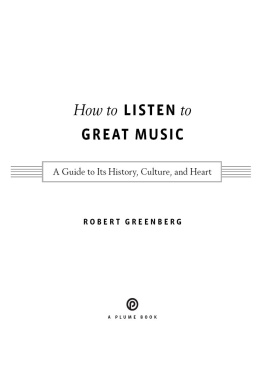
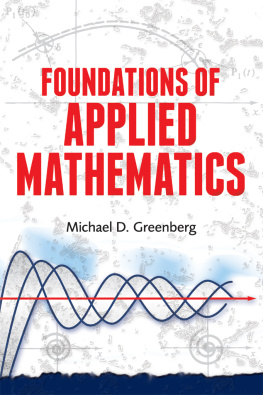
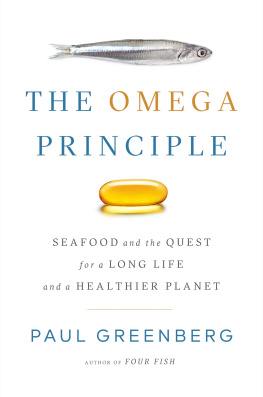
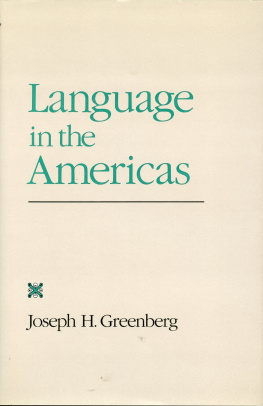



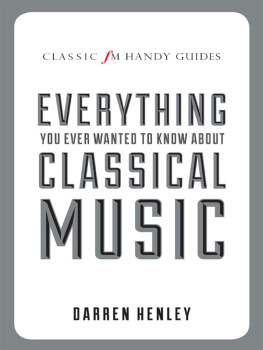
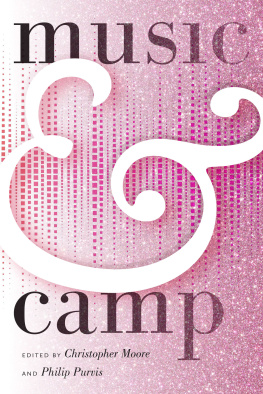
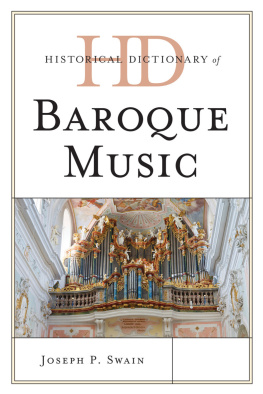

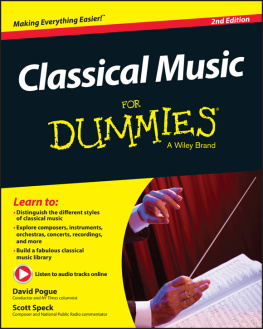
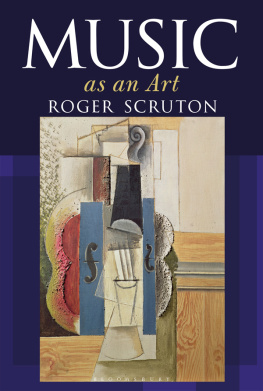
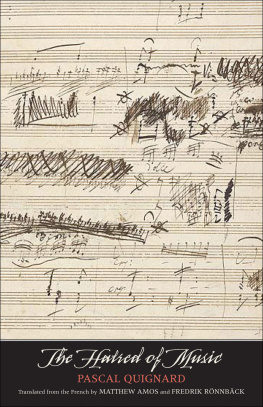
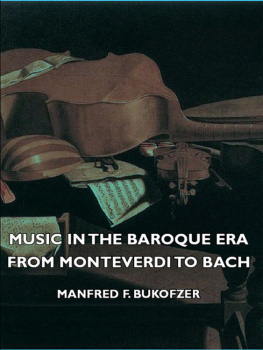
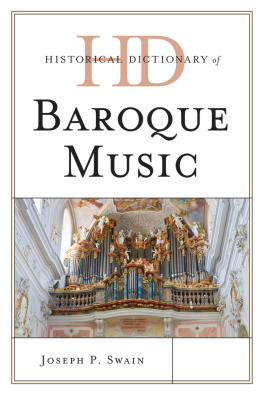
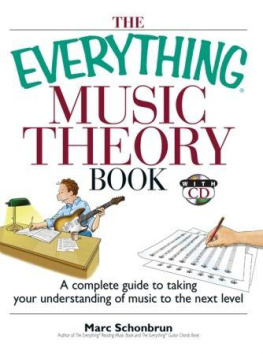


 REGISTERED TRADEMARKMARCA REGISTRADA
REGISTERED TRADEMARKMARCA REGISTRADA